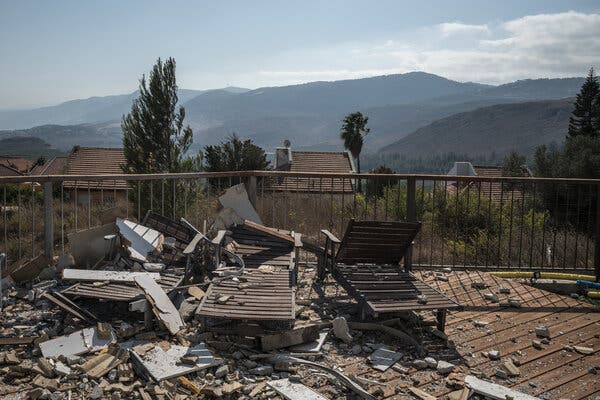His comments reflected a renewed effort by his administration to seek restraint from Israel to try to avoid a growing war in the Middle East.

President Biden said Wednesday that he would not support an attack by Israel on Iranian nuclear sites in retaliation for Tuesday’s missile attack, signaling a renewed effort by his administration to seek restraint from Israel in the hopes of avoiding a wider, regional war in the Middle East.
Mr. Biden told reporters that leaders of the Group of 7 countries had agreed in a call Wednesday morning to impose new sanctions on Iran in the wake of the ballistic missile attack on Israel. He said all of the leaders on the call — from France, Canada, Japan, Britain, Italy and Germany — agreed that Israel had the right to respond to the Iran’s military assault.
But when a reporter asked whether he would support a decision by Israel to attack Iran’s nuclear facilities, Mr. Biden said he would not.
“The answer is no,” he said as he boarded Air Force One on his way to tour damage from Hurricane Helene in South Carolina and North Carolina. He said a joint statement from the G7 would be issued in the next several hours.
“All seven of us agree that they have a right to respond, but they have to respond proportionally,” he said.
Mr. Biden has struggled for almost a year to convince Prime Minister Benjamin Netanyahu of Israel to exercise restraint in response to the Hamas attacks that killed more than 1,200 people, as well as the provocations from Hezbollah and Iran itself. Tuesday’s missile strike was the second time in six months that Iran had directly attacked Israel, following Israel’s killing of Hezbollah’s leader last week.
Biden administration officials have warned Mr. Netanyahu that the fighting could spiral into a broad, Middle East conflict that draws in not only Iran but the United States and other countries. But, especially in recent days, Mr. Netanyahu has pursued an aggressive military campaign that largely ignored that advice.
Israel has ratcheted into high gear its military campaign against Hezbollah, which had been engaged in cross-border attacks on Israel since Oct. 7. Mr. Netanyahu’s order to approve the assassination of Hassan Nasrallah, the Hezbollah leader, came even as the United States and a dozen other nations were calling for a cease-fire between Israel and Lebanon.
Michael D. Shear is a White House correspondent for The Times, covering President Biden and his administration. He has reported on politics for more than 30 years. More about Michael D. Shear



